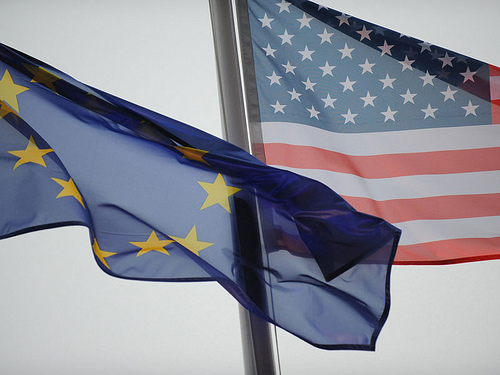
In the shadow of the French-Italian efforts to combat migration, May 1st will mark the opening of German and Austrian labor markets to the Eastern European countries who joined the EU in 2004. While budget worries plague the continent, European defense companies scored a win with Rafale and the Eurofighter beating out competition from Russia and the United States in India’s search for a new jet fighter.
Headlines:
France and Italy get backing for changes to EU border rules (EUobserver)
Several member states have indicated they are prepared to back attempts by France and Italy to make it easier for countries to re-instate border controls, following an influx of migrants from north Africa. Germany, the Netherlands, Greece and Malta have all given their blessing to Paris and Rome’s call for adjustments to be made to the Schengen Agreement on passport-free travel within most of the EU, while underlining the importance of an "open Europe".
Germany Finally Opens Labor Market to Eastern Workers (Speigel)
On May 1, Germany and Austria will open up their labor markets to citizens of the Eastern European countries that joined the EU in 2004 — seven years after most other EU members let them in. But Berlin’s protectionist fears have only hurt the German economy, as the country will struggle to attract enough skilled workers.
Hungary hopeful of reaching deal on economic governance (European Voice)
MEPs take tougher line than finance ministers; role of Commission the main stumbling block. Member states are still hopeful that six legislative proposals on economic governance will be agreed by the end of June despite the European Parliament distancing itself from the position agreed by finance ministers.
Fitch casts doubt over EU project bonds rating (Euractiv)
EU plans to create a market for project bonds to cover the €2 trillion of investment needed to upgrade the bloc’s infrastructure by the end of the decade have received a positive evaluation from credit rating agency Fitch, but are unlikely to secure a top rating.
Madrid vs Barcelona in budget struggle (El Pais)
"Catalonia to take on government over its weak deficit reduction plan," headlines El País, in the wake of a "tense" meeting of the Fiscal and Financial Policy Council in Madrid which was marked by conflict between Elena Salgado and economic advisers to Spain’s autonomous communities. The Minister for the Economy "rejected adjustments proposed by six regional governments," notes the daily, prompting "a serious clash between the central government and the regions, especially Catalonia." El País points out that although Spain’s public debt is still lower than average for a European country, certain autonomous communities are "in danger of financial suffocation." The newspaper adds that "healthy fiscal coordination will be crucial to allay doubts about public spending deficits "at a time when Brussels is keeping a close watch on the public finances of countries in difficulty" and the markets "have yet to be convinced that Europe’s institutions can ensure a minimum of fiscal coordination which is now vitally important for Spain." (Full Text in Spanish)
‘A Green Leader Has Risen’ in Baden-Württemberg (Spiegel)
It’s official — the leader of the Green Party in Baden-Württemberg, Germany’s third largest state, will become its governor. The Green Party has momentum again in Germany, for the first time since the departure of Joschka Fischer six years ago.
PM ‘not ruled out’ arming rebels (Defence Management)
Prime Minister David Cameron has indicated that the UK may choose to arm rebels in Libya as NATO looks to increase pressure on Colonel Gaddafi. Interviewed on the US network CBS, Cameron was asked if he could envision going beyond providing military advisers and moving to arm rebels in "a more significant way".
UN Security Council fails to condemn Syria despite European push (Deutsche Welle)
As violence against anti-government protesters continues in Syria, the West struggles to find a common position. A European-drafted condemnation of the regime’s crackdown was rejected at a UN Security Council meeting.
Ice hockey paves the way to Moscow thaw (SME)
"Only a day left before the hockey," announces SME in the run-up to the International Ice Hockey Federation Championship which opens in Bratislava on 29 April. In its report, the daily also notes that the competition is set "to serve as a diplomatic ice-breaker.” Over the last six months, Slovak diplomats have been hoping that the sport which is very popular in Russia will help improve their country’s troubled relations Moscow. Already the championship has resulted in plans to re-establish a direct air link with Russia, which should be running by the end of June, and the number of visa applications from Russian tourists is set to increase by 70 percent this year. “It is a very useful communications tool for reaching out to ordinary people as well as official representatives, and an excellent means for marketing the country. And we know exactly how to use it to our advantage,” remarks the Slovak ambassador to Denmark, Radomír Boháč, who is quoted by SME.(Full Text in Slovak)
India Shortlists Rafale, Eurofighter for Jet Deal (Defense News)
India has shortlisted Dassault’s Rafale and the Eurofighter Typhoon for a $12 billion dollar fighter jet deal, cutting out U.S. bidders from one of the largest military contracts of recent years. The U.S. embassy in New Delhi confirmed April 28 that Lockheed Martin’s F-16 and Boeing’s F/A-18 Super Hornet had both been ruled out of the running for India’s planned purchase of 126 multirole combat aircraft.
EDITORIALS AND COLUMNS:
‘Germany Needs Immigrants’ (Spiegel)
Germany is opening up its labor market to workers from EU member states in Eastern Europe. In a SPIEGEL interview, Polish migration expert Krystyna Iglicka explains why Germany should welcome Eastern European immigrants.
Image: transatlantic.jpg
